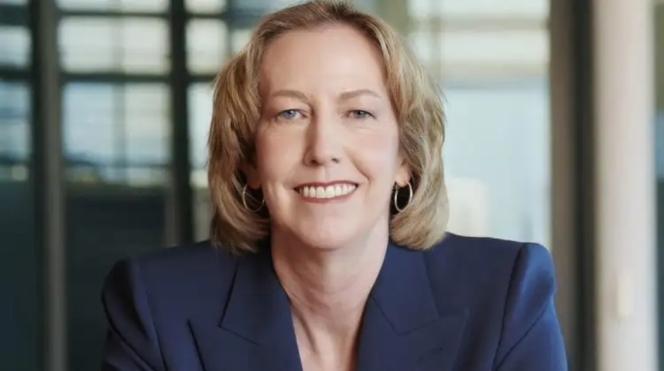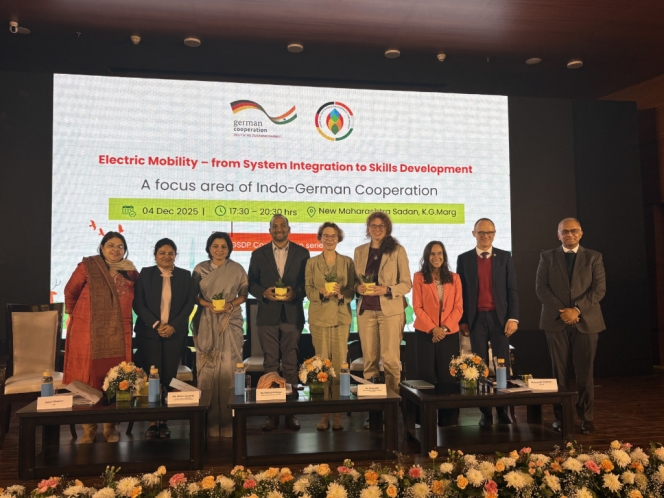European Commission Aims To Secure The Future For Europe’s Car Industry
- By MT Bureau
- March 04, 2025

Once a dominant force, the European automotive industry has been seeing signs of a slowdown as automakers in Asia, especially China, have evolved and brought competition to their domestic market.
In what can be seen as a call for action, Ursula von der Leyen, President of the European Commission, has asked to “secure the future of the car industry in Europe”.
“For example, we have agreed that we need a big push in software and hardware for autonomous driving. We know that global competition is fierce. So we have to act big and we have to be big. Scale on this topic matters, more than ever before. That is why we have agreed that we will set up and support an industry alliance. Companies will be able to pool resources. They will develop shared software, chips and autonomous driving technology. On our side, we will refine the testing and deployment rules. We will also help launch large-scale pilots for autonomous driving. Because the goal is very simple: We have to get autonomous vehicles on Europe's roads faster,” said Leyen.
She agreed that while there has been a significant push towards clean mobility, there is a ‘clear demand for more flexibility on CO2 targets.’
The idea is to balance between first movers and others who demanded fore more pragmatism in these difficult times. She was referring to penalties in case of non-compliance for 2025 targets.
“I will propose a focused amendment to the CO2 Standards Regulation this month. Instead of annual compliance, companies will get three years – this is the principle of banking and borrowing; the targets stay the same; they have to fulfil the targets. It means more breathing space for industry and more clarity, and without changing the agreed targets. I am sure that such a targeted amendment could be agreed swiftly by the European Parliament and the Council. Because it of course only makes sense if it is agreed quickly. At the same time, we will prepare to speed up work on the 2035 review, with full technology neutrality as a core principle,” stated Leyen.
The executive also asked the automotive industry to strengthen its supply chain to be more robust and resilient, especially compared to the imported cheaper EV batteries. She said that it is essential that EVs do not become more expensive without creating new dependencies.
- BP
- Meg O'Neill
- Murray Auchincloss
- Carol Howle
- Woodside Energy
- BHP Petroleum International
- ExxonMobil
- Albert Manifold
BP Appoints Meg O’Neill As New Chief Executive Officer
- By MT Bureau
- December 19, 2025

British energy major BP has announced that it’s Board has appointed Meg O’Neill as the company’s next Chief Executive Officer (CEO), effective 1 April 2026.
She will succeed Murray Auchincloss, who has stepped down from his position as CEO and director of the board, effective 18 December 2025. Carol Howle, currently Executive Vice-President for supply, trading and shipping, will serve as interim CEO until O’Neill joins the company. Auchincloss will remain in an advisory role until December 2026 to assist with the transition.
At present, O’Neill is the current CEO of Woodside Energy, a position she has held since 2021. During her tenure, she managed the acquisition of BHP Petroleum International. Prior to joining Woodside in 2018, she spent 23 years at ExxonMobil in technical and operational roles.
Albert Manifold, Chair of BP, said, “We are delighted to welcome Meg O’Neill to the BP team. Her proven track record of driving transformation, growth, and disciplined capital allocation makes her the right leader for bp. Her relentless focus on business improvement and financial discipline gives us high confidence in her ability to shape this great company for its next phase of growth and pursue significant strategic and financial opportunities.”
“Following a comprehensive succession planning process, the Board believes this transition creates an opportunity to accelerate our strategic vision to become a simpler, leaner, and more profitable company. Progress has been made in recent years, but increased rigor and diligence are required to make the necessary transformative changes to maximise value for our shareholders,” added Manifold.
Meg O’Neill, said, “BP plays a critical role in delivering energy to customers around the world. I am honoured to serve as the company’s next CEO. With an extraordinary portfolio of assets, BP has significant potential to reestablish market leadership and grow shareholder value. I look forward to working with the BP leadership team and colleagues worldwide to accelerate performance, advance safety, drive innovation and sustainability and do our part to meet the world’s energy needs.”
Murray Auchincloss, noted, “After more than three decades with BP, now is the right time to hand the reins to a new leader. When Albert became Chair, I expressed my openness to step down were an appropriate leader identified who could accelerate delivery of BP’S strategy. I am confident that BP is now well positioned for significant growth and I look forward to watching the company’s future progress and success under Meg’s leadership.”
The board confirmed that Howle’s appointment ensures continuity, citing her 25-year history with the firm.
ContiTech Launches Reduced Dimension Spiral Hydraulic Hose Series For APAC Region
- By MT Bureau
- December 18, 2025

ContiTech, a Continental group sector, has officially introduced its new Reduced Dimension Spiral hydraulic hose series to the Asia-Pacific market. Designed specifically for construction, agricultural and mining machinery, this series aims to improve equipment efficiency through high-pressure capability, flexibility, a lightweight build and extended service life.
The hose incorporates a four- to six-layer spiral of high-tensile steel wire and an optimised synthetic rubber inner tube. This construction yields a more compact and lighter hose with a tighter bending radius, allowing for easier installation in space-constrained machinery like excavators and loaders. The reduction in weight and size contributes to lower system load and energy consumption while also simplifying logistics, installation and maintenance for improved efficiency across the value chain.
Engineered for extreme conditions, the series operates reliably in temperatures ranging from –40°C to +120°C. It maintains flexibility in deep cold and provides strong resistance to oil and swelling at high temperatures. A durable inner tube and weather-resistant cover ensure consistent performance in demanding settings, from arctic mines to high-temperature industrial plants, minimising environmental stress and the need for frequent maintenance.
The product line spans working pressures from 4,100 to 6,100 psi, complies with ISO 18752 CC class standards and carries MSHA flame-resistance certification, adhering to a 4:1 safety factor. This multi-pressure design allows equipment manufacturers to consolidate hose variants, simplifying inventory management, reducing storage costs and maintaining safety across diverse high-pressure uses. Standardisation further streamlines customer processes in assembly, procurement and upkeep.
Tailored for the Asia-Pacific region, the SRDS version features a reinforced synthetic rubber cover that excels in repeat bending applications. Its compound resists surface cracking in tough conditions, including low temperatures, offering a reliable and cost-effective solution. For more severe environments, the XRDS series includes an abrasion-resistant cover for enhanced protection against impacts, friction, and wear in mining, construction, and forestry, thereby extending service life and reducing downtime.
Aligning with its customer-focused approach, ContiTech applies its expertise in high-performance materials and manufacturing to provide safe, efficient and sustainable solutions. The company collaborates with industry partners to advance reliability, efficiency and sustainability across the construction sector.
Xin Song, Head of Mobile Industrial Solutions, Industrial Solutions APAC, ContiTech, said, “The construction, agriculture and mining industries are rapidly transforming towards greater reliability, lower emissions and smarter equipment systems. Leveraging over 150 years of materials expertise, ContiTech develops customer-centric solutions. The Reduced Dimension Spiral series was engineered with deep insights into industry challenges, delivering breakthroughs in lightweight design, space efficiency and extreme-environment adaptability while maintaining constant high-pressure performance. It helps customers reduce equipment load, improve energy efficiency and maximise value across the full equipment lifecycle.”
Vingroup Announces $3 Billion Multi-Sector Investment In Telangana
- By MT Bureau
- December 09, 2025
Vietnam’s Vingroup has signed a strategic memorandum of understanding (MoU) with the Government of Telangana, outlining a comprehensive plan to develop a multi-sector ecosystem through a proposed phased investment of USD 3 billion. This expansive collaboration aims to drive socio-economic growth in the Indian state through major initiatives in smart urban development, electric mobility, healthcare, education, tourism and renewable energy.
The partnership’s most ambitious component is the planned creation of a large-scale smart city. This new urban area, designed to accommodate approximately 200,000 residents, will integrate sustainable planning principles with international-standard amenities and is expected to generate significant local employment. Supporting this community, Vingroup will develop essential social infrastructure, including international-grade multi-specialty hospitals and an integrated K-12 school system.
A key pillar of the initiative is establishing a sustainable electric mobility ecosystem. This involves launching India's first large-scale electric taxi service within Telangana, supported by a widespread network of charging stations. To ensure a green power supply for this fleet, urban areas and industrial zones, Vingroup further proposes to develop a substantial solar farm. The collaboration will also enhance Telangana’s tourism appeal through a dedicated complex featuring theme parks and wildlife attractions.
The Telangana government has committed to supporting these projects by facilitating land allocation, assisting with master planning and administrative procedures and mobilising the necessary connecting infrastructure. This foundational agreement not only marks a significant step in Vingroup’s international expansion but also strengthens economic and business ties between Vietnam and India, creating a framework for future cooperation and mutual growth.
A Revanth Reddy, Hon’ble Chief Minister, Government of Telangana, said, “The USD 3 billion investment by Vingroup is a massive vote of confidence in the ‘Telangana Rising’ vision, particularly our focus on sustainable urban development and green infrastructure. This is more than capital; it’s a partnership to build a futuristic, net-zero city and introduce India’s first large-scale electric taxi fleet, directly improving the quality of life for our citizens. Our government guarantees accelerated execution to ensure this global vision becomes a local reality.”
D Sridhar Babu, Hon'ble Industries Minister, Government of Telangana, said, "Vingroup's multi-sectoral commitment, spanning smart cities, solar power and advanced social infrastructure like hospitals and schools, demonstrates the stability and breadth of Telangana’s industrial policy. We are committed to translating this significant capital inflow into local opportunity, positioning Telangana as the gateway for Vietnamese and South-East Asian investment into India's fastest-growing economy."
Sanjay Kumar, IAS, Special Chief Secretary to the Government, Government of Telangana, said, “We welcome Vingroup’s presence in Telangana and recognise the achievements the Group has made in Vietnam, particularly in urban development, green infrastructure and electrified transportation. With the Group’s extensive expertise and capability to execute large-scale projects, we believe that this cooperation will mark an important step forward in shaping a modern and sustainable urban landscape and improving the quality of life for the people of Telangana.”
Pham Sanh Chau, CEO of Vingroup Asia and VinFast Asia, said, “Vingroup sees tremendous potential in Telangana and we aspire to build a long-term partnership with the state government. With our proven track record in delivering mega urban developments, large-scale infrastructure and a comprehensive electric mobility ecosystem, we believe that our collaboration with Telangana will generate tangible value, promote sustainable development and enhance the quality of life for local residents.”
- Indo-German Partnership for Green and Sustainable Development Goal
- Christine Toetzke
- Federal Ministry for Economic Cooperation and Development
India And Germany Discuss Electric Mobility Ecosystem Transformation
- By MT Bureau
- December 05, 2025

India and Germany convened a high-level roundtable under the Indo-German Partnership for Green and Sustainable Development (GSDP) to discuss solutions for advancing electric mobility ecosystems. The ninth edition of the GSDP Conversation Series focused on ‘Electric Mobility: From System Integration to Skills Development’.
The roundtable brought together senior officials from key central ministries, state and city administrations, public transport undertakings, distribution companies (DISCOMs), industry leaders and international partners to address the shift from fragmented pilots to a coordinated, ecosystem-wide transformation.
The discussion underlined that India can only achieve its electric mobility targets through integrated planning across various sectors, including renewable energy, transportation, manufacturing, finance and skills. Stronger coordination among the central government, states and cities was also noted as key to successful implementation.
The participants prioritised five key themes to shape the next phase of India’s e-mobility transition:
- Multimodal Electrification: Integrating metro, bus, shared mobility and last-mile services into a unified electric transport system.
- Charging Infrastructure and Grid Readiness: Enhancing coordination with DISCOMs, ensuring land and power capacity, standardising charging systems and strengthening battery safety and circularity.
- Financing and Procurement: Improving bankability, payment security, risk sharing, contract structures and financial instruments for e-buses and commercial EVs.
- Skills and Gender Inclusion: Addressing shortages in EV engineering, charger installation, battery management, safety and digital mobility services while expanding opportunities for women.
- Indo-German Collaboration: Advancing cooperation in areas such as grid management, multimodal planning, standardisation, battery circularity and vocational training.
Christine Toetzke, Director General for Asia, Latin America, Middle East & Eastern/Southeastern Europe, Federal Ministry for Economic Cooperation and Development (BMZ), Germany, said, “Germany and India share a long-standing partnership rooted in trust, ambition, and a shared vision for a greener future. The Green and Sustainable Development Partnership is central to our international engagement, reflecting our joint commitment to make development both climate-compatible and socially inclusive. Electric mobility is not merely a technological shift; it is a transformation of how our societies move, how we design our cities, and how we create opportunities for future generations. As India advances this transition at a remarkable scale and speed, Germany stands ready to support with system-level planning, vocational skills development and innovation in areas such as battery management and circular economy solutions. Our cooperation is a long-term investment in cleaner air, safer mobility, and more equitable access to opportunity for all.”
Senior officials emphasised the importance of aligning national schemes with local implementation capacity, noting that India now requires system-wide approaches that combine depot electrification, grid readiness, multimodal integration, transparent procurement models and a skilled workforce. The dialogue reaffirmed the commitment of both nations to accelerate clean, efficient and inclusive mobility solutions.






Comments (0)
ADD COMMENT